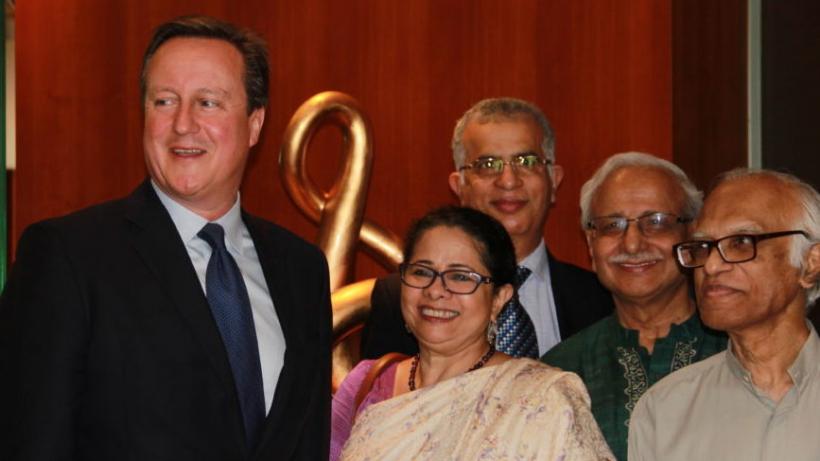
In first visit to Bangladesh, David Cameron discusses country’s growth at IGC roundtable
On 27 April, during his first visit to Bangladesh, former UK Prime Minister David Cameron participated in a roundtable discussion hosted by IGC Bangladesh on State Fragility, Growth and Development: Bangladesh’s Progress in Dhaka.
The roundtable aimed to understand and draw lessons from the ‘Bangladesh paradox’ – a term illustrating that despite weak political institutions, the country has managed to maintain impressive economic growth rates of over 6% per year over the last two decades. The growth has been inclusive with laudable reduction in poverty and improvements in education and health indicators.
The roundtable was chaired by Professor Rehman Sobhan, founder and executive chairman of the Centre for Policy Dialogue (CPD), and moderated by Sultan Hafeez Rahman, IGC Bangladesh country director, and Adnan Khan, IGC research and policy director.
Mr Cameron participated as part of his role as chair of the LSE-Oxford Commission on State Fragility, Growth and Development. The commission, launched in March 2017, aims to guide policy on economic growth in fragile and conflict situations through research.
Top Bangladeshi academics, civil society leaders, and private sector representatives who participated in the roundtable were Dr. Badiul Alam Majumdar, The Hunger Project; Rasheda K. Choudhury, Campaign for Popular Education; Asif Saleh, BRAC; Sara Hossain, Dr. Kamal Hossain & Associates; Professor Wahiduddin Mahmud, IGC Bangladesh; and Salahuddin Kasem Khan, Bangladesh Employers’ Federation.
Below are some of the major points discussed during the roundtable:
- The importance of issues such as security, state legitimacy, state effectiveness, ability of the state to facilitate inclusive growth, and rule of law for the growth prospects of Bangladesh.
- The commission should recommend that governments, development partners, and NGOs substantially enhance their engagements and assistance to countries facing fragility and conflict.
- Bangladesh seems to have some autonomous, self-sustaining, and growth-generating elements that are deeply embedded in the economy such as the garments sector. Exports have been able to withstand the violent political unrest in 2015 and the frequent general strikes since the 1990s.
- The country is at an important crossroad of development – to consolidate the gains and fulfill its aspirations of becoming a middle income country necessitates strengthening political, economic, and social governance institutions.
- The ‘Bangladesh development paradox’ can be better understood by the fact that in spite of political regime change, successive governments have effectively embedded the mandate to reduce poverty and inequality.
- Bangladesh’s remarkable gains in health and education, with low levels of public expenditure relative to that of other developing countries, were potentially partly due to the adoption and diffusion of low-cost intervention and campaigns, as evidenced by successful family planning campaigns. Additionally, the country’s high population density made the operational cost of penetration of such interventions lower. The lesson to draw is that Bangladesh been more successful in enhancing interventions, at the individual/household level, rather than at a community/broader state level.
- Bangladesh risks reaching a plateau in its growth trajectory if current economic activities continue on the back of replication of low-cost technology. There is an urgent need to raise the productivity of the economy, which requires improvement in skills and knowledge as well as raising the quality of education.
- Inflow of FDI will require ensuring a stable business environment with safety and security of life and property. There is potential for FDI inflow from SMEs in the UK, but those firms cannot bear the high overhead costs of maintaining security.
- There is a need to bolster civil society and invest in community services like legal services and effective arbitration and redressal mechanisms, particularly for communities who are vulnerable to violence and security threats. In general the space for civil society is shrinking, and the room for advocacy-based NGOs working in civic and human rights have diminished considerably.
- The ‘winner takes all’ feature of Bangladeshi democracy is conducive to creating client-patron relationships. The lack of accountability and lack of institutional capacity will aggravate the state legitimacy issue in Bangladesh, creating instability and adversely affecting growth. The recent security issues that the country is facing are potentially a serious risk, and there is a need to understand the reason for the rise of such radicalism. The extent of religious radicalisation may be more pervasive than what it appears to be.

